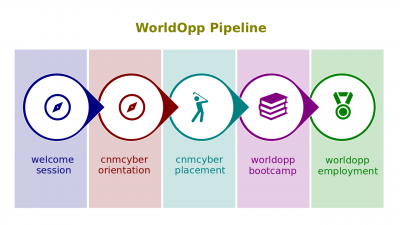Book of Recruitment
The Introduction to Recruitment (hereinafter, the Session) is the learning session that has been created to introduce its participants to recruitment and related topics. The Session consists of six lessons, each of which is made of three to six lectios. At CNM Cyber, a lectio is a lesson part. Every lectio includes a presentation and a one question, either a quiz or survey.
The official version of the Session is published at CNM Cert. The Session materials are also published at CNM Tube, CNM Wiki, and various channels for marketing and convenience purposes.
The Session belongs to the Career-Overview Sessions of the CNM Cyber Orientation.
Contents
Summaries
Predecessor
- The predecessor session is Introduction to Employment.
Outline
Successor
- The successor session is Introduction to Careers.
2019 presentation
The video preview presentation, 1:43 minutes, is published at https://youtu.be/Emr8exlqUfc. Here is its full text:
Introduction to Recruitment Preview. In the previous session which was introduction to employment, we discussed that employment consist of two parts. Employees and employers. Employees give their time and employers pay them money but the people who bring together employees and employment candidates and employers are recruiters, recruiters play a significant part in this process.
In this session we are going to review the recruitment process, we will go over rational acquisition model, we will discuss selection and how selection goes, like the selection process, we will review onboarding which brings new employees to the company, we will discuss statement of recruitment needs, we will talk about KSA`s which are knowledge skills and abilities, we will discuss funding potential candidates screening of those candidates and we will end with the services of recruiters including house hold recruitment and recruitment fees.
Hopefully we will be ready to jump to carrier administration as the successor lecture.
Quiz
- Every statement below is split into one true and one false question in the actual exam.
- Job analysis is (not) an assessment that defines jobs and the behaviors necessary to perform them.
- Job description is (not) an assessment that defines jobs and the behaviors necessary to perform them.
- Job analysis is (not) a written statement that describes a job.
- Job description is (not) a written statement that describes a job.
- KSA stands (or does not stand) for knowledge, skills, and abilities.
- KSA is (not) a series of narrative statements that describe competencies that the employer is looking for.
- Work-related knowledge is (not) a part of KSA.
- Work-related skills are (not) a part of KSA.
- Work-related abilities are (not) a part of KSA.
- Work-related knowledge is (not) a familiarity, awareness, or understanding of someone or something needed for a particular job.
- Work-related knowledge is (not) the learned ability to carry out a task with pre-determined results relevant to a particular job.
- Work-related knowledge is (not) the capability to perform some function or functions and achieve certain outcomes important to a particular job.
- Work-related skill is (not) a familiarity, awareness, or understanding of someone or something needed for a particular job.
- Work-related skill is (not) the learned ability to carry out a task with pre-determined results relevant to a particular job.
- Work-related skill is (not) the capability to perform some function or functions and achieve certain outcomes important to a particular job.
- Work-related ability is (not) a familiarity, awareness, or understanding of someone or something needed for a particular job.
- Work-related ability is (not) the learned ability to carry out a task with pre-determined results relevant to a particular job.
- Work-related ability is (not) the capability to perform some function or functions and achieve certain outcomes important to a particular job.
